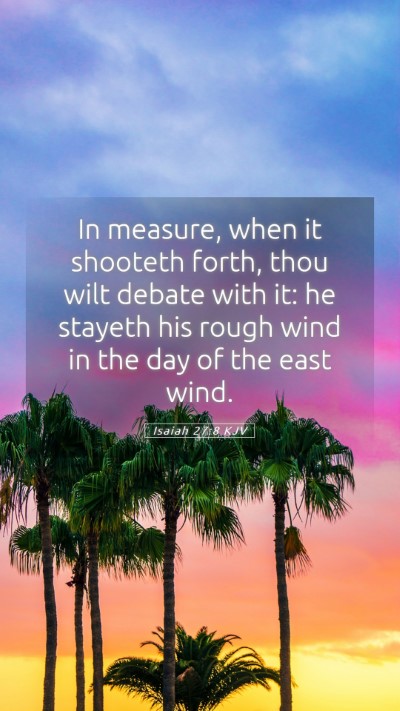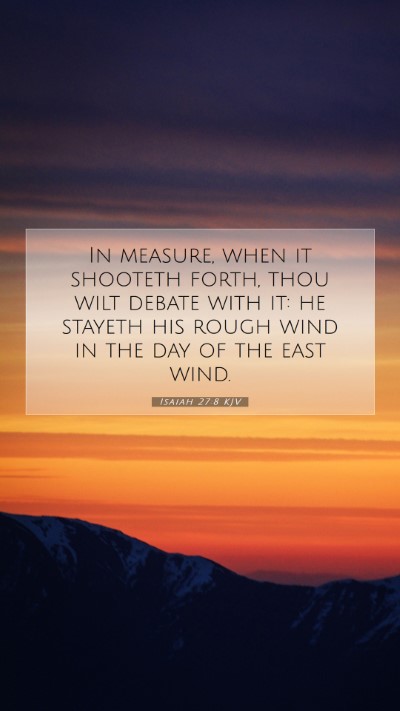Understanding Isaiah 27:8 - A Scripture Analysis
The verse Isaiah 27:8 states:
"In measure, when it shooteth forth, thou wilt debate with it: he stayeth his rough wind in the day of the east wind."
This passage carries significant implications regarding God's dealings with His people and the broader themes of judgment and restoration throughout the Book of Isaiah.
Bible Verse Meanings and Interpretations
In exploring the meaning of Bible verses, particularly Isaiah 27:8, we draw upon insights from prominent commentaries:
- Matthew Henry:
Henry observes that this verse illustrates God's measured approach to judgment and His divine ability to intervene in situations where His wrath could be unleashed. It signifies that while God may chastise His people, He does so in a controlled manner, corresponding to their shortcomings.
- Albert Barnes:
Barnes emphasizes the notion of divine mercy mingled with judgment. He elaborates that the “measure” signifies God's judicious governance where He weighs the severity of punishment against the need for correction, thereby ensuring that His people are not overwhelmed by His wrath.
- Adam Clarke:
Clarke goes deeper into the symbolism within this passage, interpreting "the east wind" as a metaphor for adversities or trials that may arise. He highlights that God, in His authority, can subdue these adverse conditions, providing comfort and protection for the faithful.
Biblical Exegesis and Meaning
This verse exemplifies the dynamic between God's judgment and His compassion. It addresses the understanding of Scripture in the context of Israel's history, where divine discipline is often paired with the hope of restoration.
According to the commentaries:
- The idea of “debating” or causing to “dispute” reflects God's intentions to bring forth dialogue and reflection among His people regarding their actions.
- The mention of God “staying His rough wind” depicts His omnipotence; He controls the forces that threaten His people while offering them a chance for repentance and restoration.
Application of Isaiah 27:8 in Daily Life
In light of this Bible verse explanation, believers are encouraged to reflect on how God interacts with humanity, especially in terms of discipline and mercy. The lessons drawn from this passage can be significant for Bible study groups, providing a deep well of discussion about God's nature and our response to His call.
Key takeaways include:
- Recognizing that God approaches judgment with discretion and care.
- Understanding that trials may serve a purpose in our spiritual growth.
- Seeking God's intervention in our adversities, trusting in His power to control life’s storms.
Related Bible Cross References
This verse can be further understood in relation to the following Scriptures:
- Isaiah 1:25: "And I will turn my hand upon thee, and purely purge away thy dross, and take away all thy tin."
- Isaiah 54:9: "For this is as the waters of Noah unto me: for as I have sworn that the waters of Noah should no more go over the earth; so have I sworn that I would not be wroth with thee, nor rebuke thee."
- Jeremiah 10:24: "O Lord, correct me, but with judgment; not in thine anger, lest thou bring me to nothing."
Conclusion
Isaiah 27:8 provides profound insight into the character of God and His dealings with humanity, illustrating themes relevant to both historical context and modern beliefs. This passage serves as a reminder of God's mercy amid judgment and encourages believers to seek His understanding in their spiritual journeys.
As you delve further into Bible study lessons, reflect on the significance of this verse in your life and community, facilitating deeper Bible study discussions that embrace the complexities and beauties of God’s Word.


